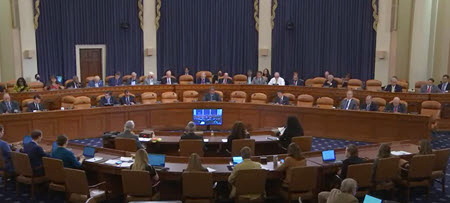
Policymakers discussed the nation’s scarcity of affordable housing, legislation that could boost the housing supply, and institutional ownership in the single—family home market during a July 12 House Ways and Means Committee hearing, which followed a similar House Financial Services Subcommittee hearing last month. (Roundtable Weekly, July 1)
Housing Market Challenges
- Ways and Means Democrats focused on the role of the pandemic in exacerbating the shortage of affordable housing, expressed concerns regarding growing institutional ownership of homes and the practices of corporate landlords, and reiterated support for policies such the low-income housing tax credit (LIHTC).
- Committee Republicans emphasized how high inflation has shut many buyers out of the market. (Hearing video and testimony, July 13)
- Committee Chairman Richard Neal (D-MA) stated, “Our families and communities can’t thrive without quality, affordable housing. But too many Americans face skyrocketing housing costs, long waiting lists, new pressure from institutional investors, and unprecedented bidding wars that keep them out of the housing market.” (Neal opening statement)
- Neal added that an expansion of the Low-Income Housing Tax Credit (H.R. 2573) and passage of the Neighborhood Homes Investment Act (H.R. 2143) would create nearly 1 million additional affordable homes. (Joint Committee on Taxation, Present Law and Background Relating to Tax Incentives for Residential Real Estate, July 13)
- Committee Ranking Member Kevin Brady (R-TX) blamed Democratic policies for driving the annual inflation rate to 9.1 percent and increasing the average home price by $100,000. (CNBC, July 13)
Housing Affordability and Institutional Investment

- Christopher Herbert of the Joint Center for Housing Studies at Harvard University, which recently published The State of the Nation’s Housing 2022, noted that although institutional investors have contributed to the demand for single-family homes, supply shortages predating the pandemic are the primary culprit behind rising prices. (Herbert testimony, July 13)
- Edward Pinto of the American Enterprise Institute testified, “Vilifying institutional landlords distracts from the underlying issues facing the housing market.” He continued, “On the single-family side, they account for too small a share of purchases and of the housing stock nationally. Even in the few metros where their share is higher, it is not enough to move the price needle, especially at the low end of the market.” (Pinto testimony, July 13)
- Several witnesses addressed legislative proposals that would boost the supply of housing—including H.R. 2143, introduced by Rep. Brian Higgins (D-NY), that would establish a new tax credit for developers rehabilitating vacant properties into affordable homes—and H.R. 2573, introduced by Rep. Suzan DelBene (D-WA), that increase the low-income housing tax credit. (CQ, July 13 | Higgins news release, July 1, 2020 and DelBene news release, April 15, 2021)
- The New York Times reported this week on how the lack of affordable housing, once a problem largely limited to the coastal markets, now has spread across the country. Freddie Mac estimates the nation needs 3.8 million housing units to keep up with household formation. (Image above, New York Times)
- Roundtable President and CEO Jeffrey DeBoer recently addressed the issue of housing costs, “Expanding the supply and availability of affordable housing deserves a coordinated local, state, and national policy action plan. Local zoning restrictions, permitting issues, and the oversized influence of NIMBYs—coupled with high and now significantly rising labor and material costs—are the true factors limiting housing supply, and in turn, increasing housing costs.” (Roundtable Weekly, July 1)
Roundtable Support

- The Roundtable Policy Agenda, above, states, “More can be done to incentivize builders, developers, and owners to create low- and middle-income affordable housing. Low-income housing tax credits and incentives for land-use permitting and zoning reform should be enhanced.”
- Additionally, The Roundtable’s Real Estate Capital Policy Advisory Committee (RECPAC) has formed an Affordable Housing Working Group, which is working with the Research Committee to develop proposals on expanding the nation’s housing infrastructure.
Next week, a Senate Finance Committee hearing will focus on "The Role of Tax Incentives in Affordable Housing." The July 20 hearing will include testimony from Dana Wade, Chief Production Officer, Real Estate Finance at Walker & Dunlop.
# # #

